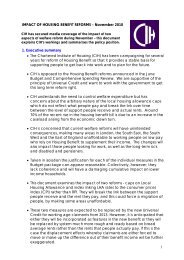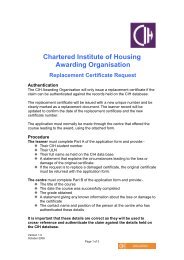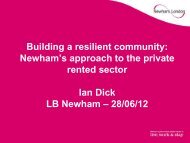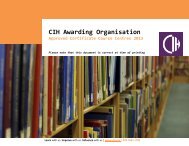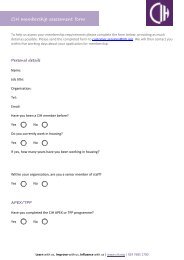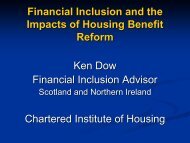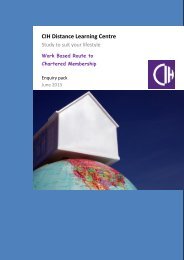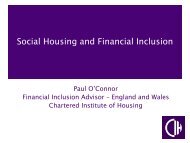View publication - Chartered Institute of Housing
View publication - Chartered Institute of Housing
View publication - Chartered Institute of Housing
You also want an ePaper? Increase the reach of your titles
YUMPU automatically turns print PDFs into web optimized ePapers that Google loves.
PART ONE: LEARNING TODAY<br />
All staff need to be familiar with their own adult safeguarding policies, their local multiagency<br />
policies on adult safeguarding and the Social Care <strong>Institute</strong> for Excellence<br />
materials on adult safeguarding. 37 They also need to understand the principles and<br />
implications <strong>of</strong> the Mental Capacity Act 2005 and the Human Rights Act 1998.<br />
Staff at all levels will need to enhance their assertiveness and other skills in working with<br />
pr<strong>of</strong>essionals from other disciplines, in particular, to work to change negative attitudes<br />
towards housing.<br />
Jeremy Porteus’ article (above) comments on the lack <strong>of</strong> knowledge that different<br />
sectors have about the skills and services <strong>of</strong> each other. My own research on lessons for<br />
housing providers from adult SCRs pointed to negative attitudes by ASC staff being a<br />
contributory factor in the exclusion <strong>of</strong> housing from partnership working and<br />
information sharing. Senior staff will need to be prepared to intervene more frequently,<br />
on behalf <strong>of</strong> junior staff, in the event <strong>of</strong> poor responses to referrals, exclusion from<br />
strategy meetings, delays in safeguarding investigations, failures in sharing information,<br />
unclear monitoring arrangements and disagreements about definitions <strong>of</strong> vulnerability.<br />
The following tips may help housing providers develop proactive approaches and form a<br />
checklist which can inform learning on the ground:<br />
If staff are told that the alert or referral cannot be accepted (as it doesn’t meet their<br />
referral threshold or their definitions <strong>of</strong> abuse or vulnerable adult/adult at risk), consider<br />
the following points:<br />
• Check what their policy says on alert and referral criteria and definitions. Is their<br />
interpretation open for discussion?<br />
• Reconsider the facts <strong>of</strong> your referral – have you left something out and/or<br />
underestimated/downplayed the risks?<br />
• Ask if they have a mechanism for gathering information on apparently low level<br />
cases, especially where there is an emerging pattern <strong>of</strong> referrals.<br />
• Ask for advice on how to handle the situation yourself or via other agencies.<br />
• If the case is not accepted and investigated, refer again if circumstances and risks<br />
change.<br />
If staff are told ‘it is the person’s choice’ (for example, to refuse services or intervention)<br />
or that ‘they have capacity and the right to make unwise decisions’ consider the<br />
following points:<br />
52




